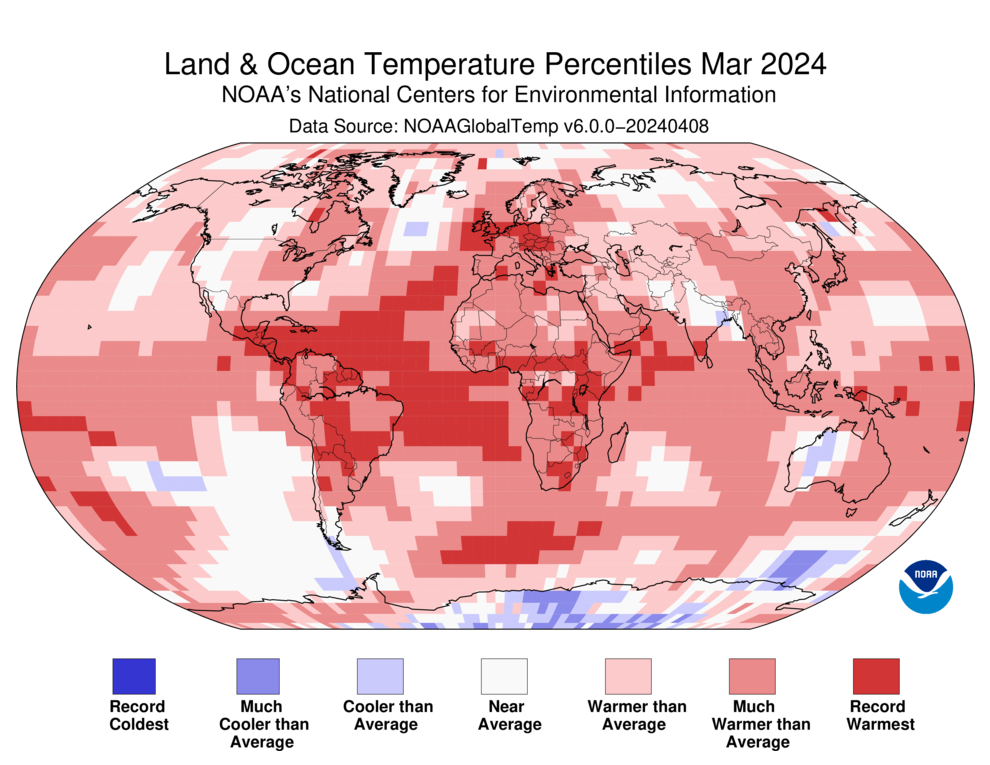Earth added another remarkably warm month to the year, with March 2024 ranking as the warmest March in the planet’s climate record.
Last month also continued the world’s streak of record-breaking warm months — 10 in a row — according to scientists and data from NOAA’s National Centers for Environmental Information (NCEI).
How far back do official weather records go back? That data goes back to before the Civil War. If you wondering, the Civil War occurred between April 12, 1861 – April 9, 1865. Official weather recording devices were established in the 1850s by the Smithsonian Institution and many Civil War era men and women recorded daily weather-related information in diaries and letters so that it is possible to get a general idea of the weather in a variety of places during the years of the war.
Not only was it the hottest March in Earth’s climate history, it was also the 10th month in a row that was the hottest on record, itself an ongoing record-breaking streak.

Sizzling March heat with 105º Fahrenheit at Ipanema beach in Rio de Janeiro, Brazil. [EPA-EFE/ANTONIO LACERDA]
Sure, places like Florida saw one of the coolest winter in years (it was the coolest in more than a decade for Palm Beach County) due to a strong El Niño that kept many Florida winter days in clouds with many visiting cold fronts that brought much needed rain and cool weather.
But globally, it was hot. In the picture above you see Ipanema beach in Rio de Janeiro, Brazil. People flocked to the water to seek relief as the temperature there soared to an incredible 105º Fahrenheit on March 17, 2024.

Globally, March was sizzling
March, in particular, was 2.43 degrees F (1.35 degrees C) above the 20th-century average of 54.9 degrees (12.7 degrees C), ranking as the warmest March in the 175-year global climate record. March 2024.
Looking at the continents, Africa and South America had their warmest March on record while Europe saw its second warmest. In contrast, parts of western North America, central Asia and western Australia were cooler than average last month.
Year to date (YTD, January through March)
The 2024 YTD global surface temperature was the warmest such period on record at 2.43 degrees F (1.35 degrees C) above the 20th-century average. South America had its warmest year-to-date period, while Africa, Europe and Oceania had their second warmest.
According to NCEI’s Global Annual Temperature Outlook, there is a 55% chance that 2024 will rank as the warmest year ever recorded, and a 99% chance that it will rank in the top five warmest.
“The exceptional warming that we’re experiencing is not something we’ve seen before in human history,” said Gavin Schmidt, director of NASA Goddard Institute for Space Studies (GISS) in New York. “It’s driven primarily by our fossil fuel emissions, and we’re seeing the impacts in heat waves, intense rainfall, and coastal flooding.”
Climate and human health
As climate warming continues, concern about climate and human health is growing daily. A study by First Street Foundation shows that a quarter of the country will fall inside an “extreme heat belt” with heat index temperatures exceeding 125 degrees by 2053.
That extreme heat belt is expected to stretch from Texas to Illinois, over the next 30 years. According to the foundation, this means that 1,023 counties across the US will experience “feels like” temperatures above 125 degrees by 2053. The states likely to see the greatest growth in dangerous days are Texas, Louisiana, Arkansas, Missouri and Florida, First Street’s analysis found.

Right now in Florida, there are about 73 days with “feels like” temperatures above 100 degrees. That number will go up to 107 days in 2053, about a 47% jump.
We need to be prepared for the inevitable, that a quarter of the country will soon fall inside the Extreme Heat Belt with temperatures exceeding 125°F and the results will be dire.
The counties with the largest changes in dangerous days between now and 2053 are mainly located in Florida, led by the populous areas of Miami-Dade, Broward and Palm Beach counties.
The Climate Adaptation Center is committed to education and adaptation in our communities and has significant concerns about the warming climate and human health.
On November 14-15, 2024, the CAC will host its Annual Florida Climate Conference. The theme of the 2024 CAC Florida Climate Conference will be Climate and Human Health.
This year’s edition of this important event will be held in the brand new conference facility at the University of South Florida, Sarasota-Manatee campus. Follow our website for more details about the event.


